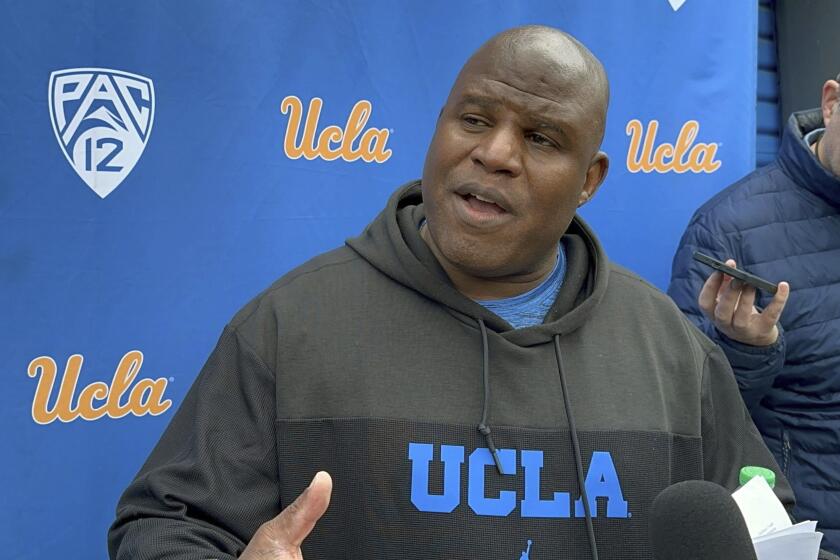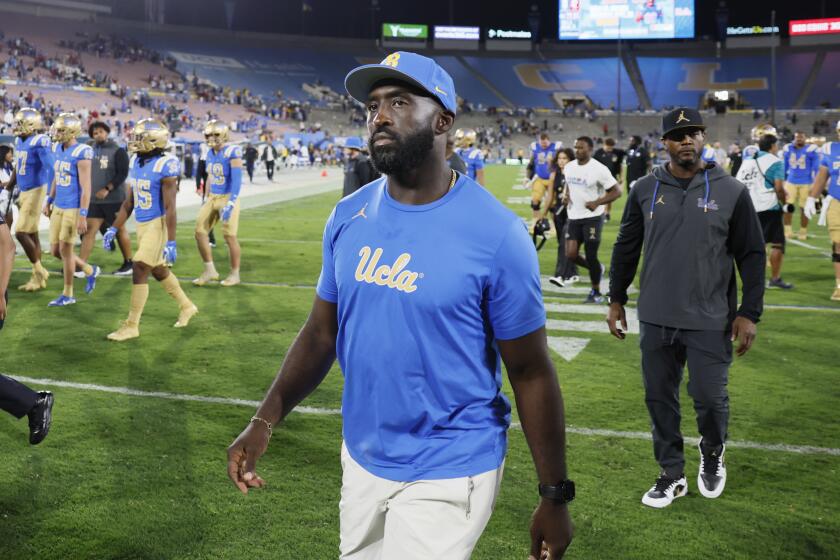Coaches find it’s no game on battlefields of Iraq
Rick Neuheisel is animated, on the edge of his chair, explaining the protocol as explained to him to survive a mortar-shell explosion.
“When the thing hits, it shoots up all the shrapnel, and that’s what kills people,” he says, his voice rising. Then he slams his hand down on the desk, adding, “So you’ve got to get your butt on the ground so it fires over the top of you.”
UCLA’s football coach is not an expert on mortars or the military. However, he did take care to learn a few basics on a recent trip to Iraq as part of Coaches Tour 2009, a series of meet-and-greets with servicemen and women that was designed to boost morale.
There’s a warning siren, he goes on to explain, but that’s not always the most telling sound. If you hear a whistling, the mortar shell is probably not close.
But . . .
“If you hear it THWACK” -- and he pounds the table even harder -- “get your [rear] down, because that means it’s right behind you.”
Neuheisel leans back, puts his arms -- which have been doing much of the talking -- on the chair’s sides, crosses one leg, rests his chin in his hands and readies another anecdote. Of which there are many.
The boyish coach has had less than a month to reflect on the trip that took him to three continents, six countries and seven military bases over nine days. Neuheisel was joined by six other college football coaches -- Texas’ Mack Brown, Ohio State’s Jim Tressel, Air Force’s Troy Calhoun, Mississippi’s Houston Nutt, Wake Forest’s Jim Grobe and former Auburn Coach Tommy Tuberville.
UCLA is scheduled to begin football practice Aug. 10, and when asked if he has some stories for his players, lessons he learned that he hopes to pass on to them, this grin emerges, and it curls into a wide smile.
“I’ll give ‘em a good story.”
Certainly the mortar one; maybe this one too:
In Adana, Turkey, Neuheisel is chowing on a 5-foot shish kebab with the other coaches, a gunnery sergeant in his ear about the flight into Iraq the next day. The sergeant says the plane is doing a “tactical landing” -- basically a nose-first landing used to avoid enemy ground-to-air fire -- into Joint Base Balad.
Neuheisel loves roller coasters, so he’s pumped. Afterward, he says it wasn’t that bad, says California Screamin’ in Anaheim is way scarier.
“I’m a little disappointed it wasn’t as advertised.”
Or this one:
In Baghdad, Neuheisel and Tressel are smoking cigars on the back porch of one of Saddam Hussein’s residences, Al Faw Palace, overlooking a massive pond, and Tressel turns to Neuheisel and says:
“You know, I’ve never gone anywhere, [but] here I am, sitting on the porch of Saddam Hussein’s castle, looking out at this pond that he artificially built and then told the farmers that the reason there was no water was because the United States had taken it.”
That night, the coaches bunk up in the same room, dorm style, all in disbelief of whose house they’re staying in.
Or this:
In Germany, Neuheisel is at the Landstuhl Regional Medical Center talking to injured soldiers, meeting one who was badly wounded after an explosive hit his truck, killing everyone aboard but him. Outside the room, people are concerned that the excitement caused by the coaches’ presence might somehow dampen this soldier’s spirits.
“But when you got into the room, it was anything but,” Neuheisel says. “He was excited. He was aware of what happened, but he wanted back in the fight.”
Nutt too was amazed.
“I’m thinking, ‘You’re leg’s blown up. You’re talking about going home?’ ” the Arkansas coach recalls.
“No, no, no,” the soldiers would say. “I’ve got to get back out there.”
There are undoubtedly parallels between sport and military -- the “team” factor, the mission of winning, plus the countless war cliches football coaches use daily -- so a trip such as this is invaluable for perspective.
David Raih, an intern in the UCLA football office who made the trip, said there were a few things that Neuheisel said could translate from the military to football: making sure expectations are clear, keeping enthusiasm high, instilling pride, and teaching players as thoroughly as the military trains soldiers.
There’s also the aspect of humility, one Nutt tried to capture in photographs when the tour took them through a village in the African country of Dijbouti, where rail-thin natives were living in huts made of cardboard, mud and branches.
“I wanted to tell my players, ‘You complain about your bed not being soft enough, well, this is their home.’ ”
Then Nutt goes into another story, one that may hit closer to home.
“When they see the dirt field these soldiers played on . . .”
In Iraq, a flag football game is scheduled, Army versus Air Force, the coaches split on each team. At lunch, a soldier comes up to Nutt, begging him not to cancel the game because a dust storm is to arrive that afternoon.
“Whatever you do, Coach, don’t cancel the game.”
They don’t, but the dust storm comes, like an enormous dark cloud, shadowing the makeshift field -- “We were shocked they were going to play,” Neuheisel remembers -- but the troops pay it little mind, the Air Force eventually winning, 21-0.
“Those kids played their guts out, and it was just unbelievable,” Nutt says.
On the sideline, Neuheisel is standing next to Texas’ Brown, and a soldier comes up and says, “Oh, it’s coming tonight.”
“What’s coming tonight?” Neuheisel asks.
“They’re going to throw a mortar in here tonight,” the soldier says, explaining that the enemy likes to fire mortars during a dust storm, when poor visibility is an advantage.
Brown and Neuheisel turn to each other and, only half-joking, Neuheisel says, “OK, this game should be just about over. . . .”
--
Go beyond the scoreboard
Get the latest on L.A.'s teams in the daily Sports Report newsletter.
You may occasionally receive promotional content from the Los Angeles Times.



